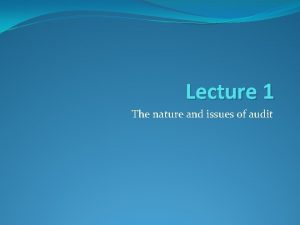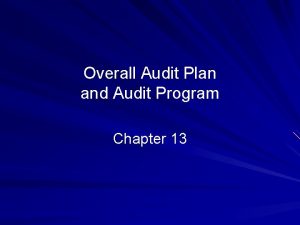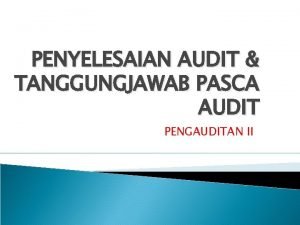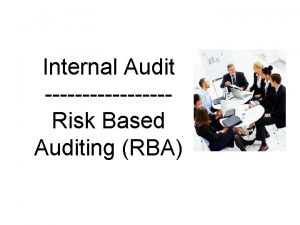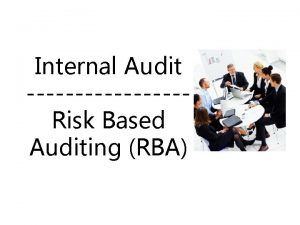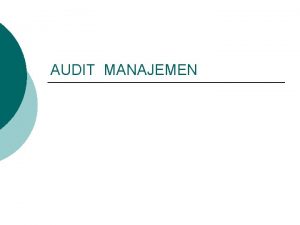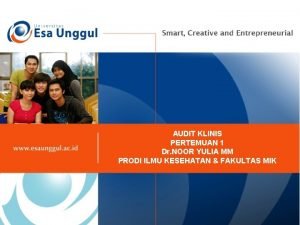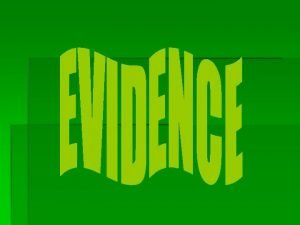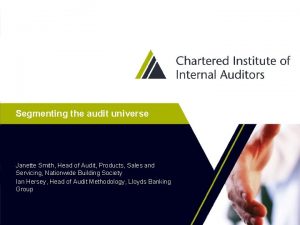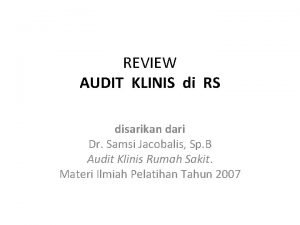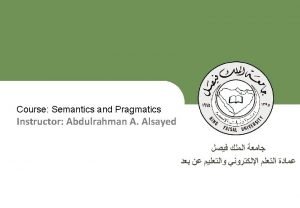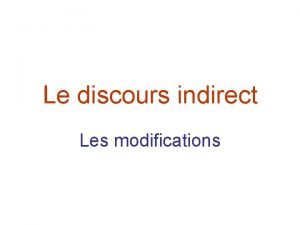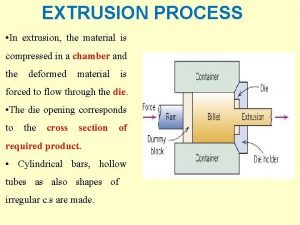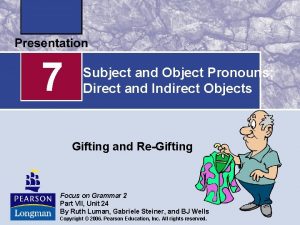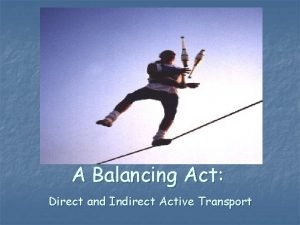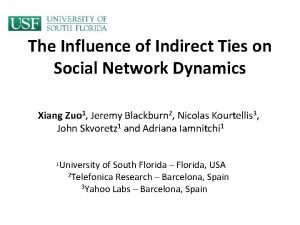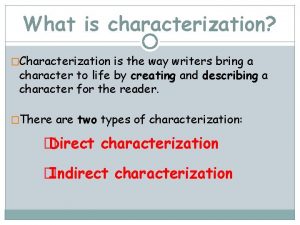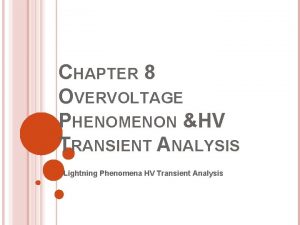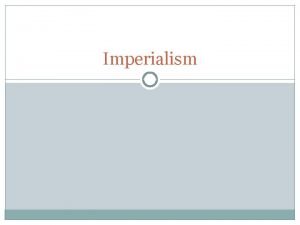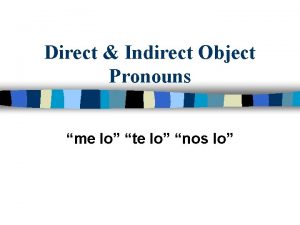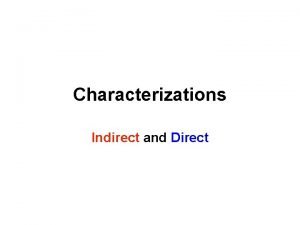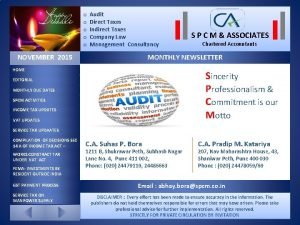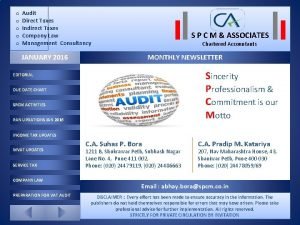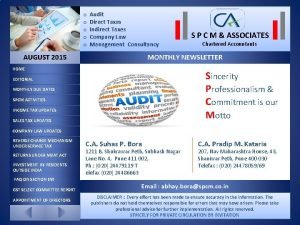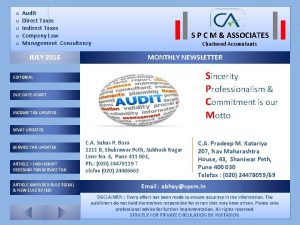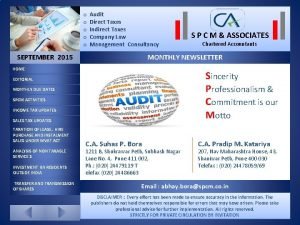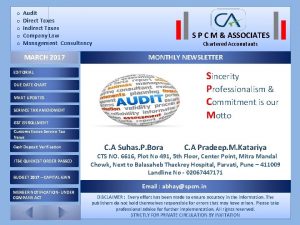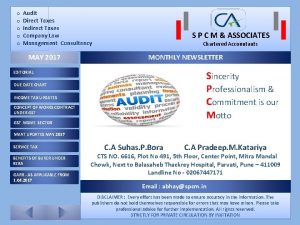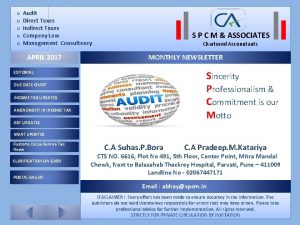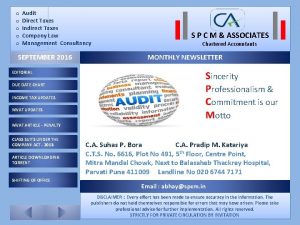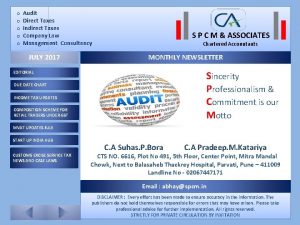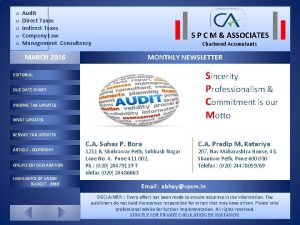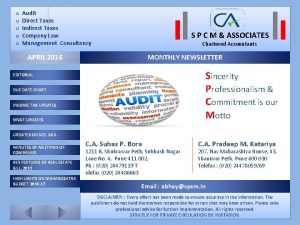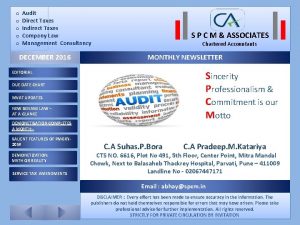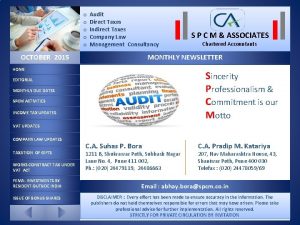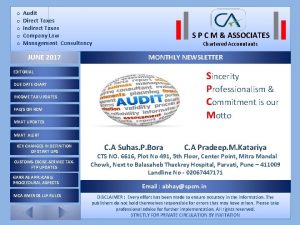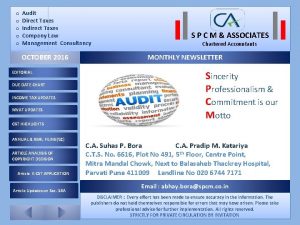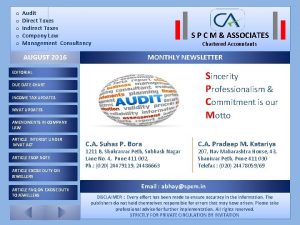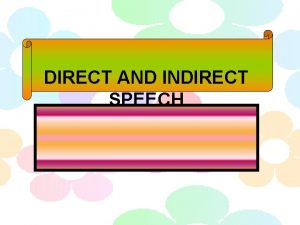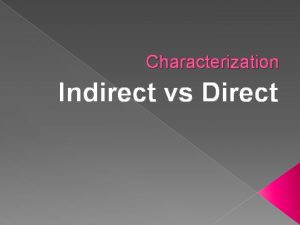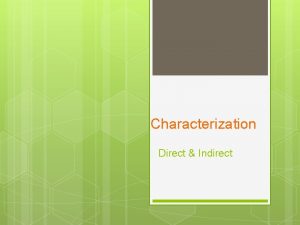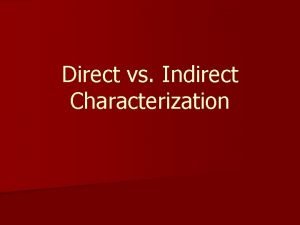o Audit o Direct Taxes o Indirect Taxes






















- Slides: 22

o Audit o Direct Taxes o Indirect Taxes o Company Law o Management Consultancy FEBRUARY 2017 EDITORIAL DUE DATE CHART HIGHLIGHTS OF UNION BUDGET 2017 INCOME TAX UPDATES MVAT UPDATES S P C M & ASSOCIATES Chartered Accountants MONTHLY NEWSLETTER Sincerity Professionalism & Commitment is our Motto ARICLE – SERVICE CHARGE ARTICLE - SPICe ARTICLE - SPREE ESI AMNESTY SCHEME ARTICLE - BOGUS SHARES AND SEC. 68 ARTICLE - IMPROVISED VAT AND CST PROCEDURE C. A Suhas. P. Bora C. A Pradeep. M. Katariya CTS NO. 6616, Plot No 491, 5 th Floor, Center Point, Mitra Mandal Chowk, Next to Balasaheb Thackrey Hospital, Parvati, Pune – 411009 Landline No - 02067447171 Email : abhay@spcm. in DISCLAIMER : Every effort has been made to ensure accuracy in the information. The publishers do not hold themselves responsible for errors that may have arisen. Please take professional advice for further implementation. All rights reserved. STRICTLY FOR PRIVATE CIRCULATION BY INVITATION

SPCM & ASSOCIATES MONTHLY NEWSLETTER FEBRUARY 2017 Editorial - CA. Suhas P. Bora Dear All Happy morning Now a day there are only two hot topics for discussion everywhere, first one is the GST and another one is impact of demonetization as well as new disclosure under Pradhan Mantri Garib Kalyan Yojana. On the GST front, 9 th meeting of the Council was successful and result oriented. The decisions taken in the meeting are summarized as under: Roll out on July 2017. Consensus on duel control. Tax on economic activity in territorial waters Centre to have levy and collection power of IGST with special provisions relating to cross empowerment of states. Now all eyes are on the Budget 2017 which will be delivered for the very first time on the 1 st February. The Government will surely look at soothing the wounds of the common man either by reducing the tax rates or increasing the basic taxation limits or may be both. The FM remarked, “What you need is a broader base of the economy, for which you need a lower level of taxation”. Only 3. 3% of the population pays tax in India, which is very low compared to 39% in Singapore, 46% in the US, and 75% in New Zealand – even if the number here could be doubled to 7%, it will amount to a windfall in tax collections. With GST around the corner, the stage is set to bring in all the unorganized sector into the tax system by increasing compliance and vigilance. The government seems to be all ready for the GST rollout and has already trained three-fourth of the targeted 60, 000 field officers who would be instrumental in implementing the new GST regime. But it seems that the industry is falling behind. It will be a herculean task to train the unorganized sector in this new law, many of whom probably may for the very first time pay any taxes. SPCM is gearing up to take this challenge of creating atmosphere for implementation and soon will roll out a schedule in this context by giving lectures and presentation on GST. EDITORIAL DUE DATE CHART HIGHLIGHTS OF UNION BUDGET INCOME TAX UPDATES MVAT UPDATES ARICLE – SERVICE CHARGE ARTICLE - SPICE ARTICLE - SPREE ESI AMNESTY SCHEME ARTICLE - BOGUS SHARES AND SEC. 68 IMPROVISED VAT AND CST PROCEDURE

FEBRUARY 2017 SPCM & ASSOCIATES MONTHLY NEWSLETTER Editorial - CA. Suhas P. Bora With the tax scrutiny season is over and the last date of depositing demonetized currency into the bank coming to an end , we may be a witness to a slew of notices being issued inquiring about the source of the cash deposits. Though it is within the power of the Income Tax department to ask questions, unless and until the officers are made accountable for unnecessary harassment and without any proper direction, this can be a new avenue of corruption. It is high time that there is transparency and accountability of those governing the law and respect given to the honest tax payers. Cashless payments have been given a huge impetus. E-wallets, net banking, debit/credit cards, mobile banking, NEFT/RTGS…are all witnessing phenomenal growth trajectories. The banks and payment companies are going all out to woo customers with high decibel promotions reiterating the benefits of going cashless. Even the government has joined the bandwagon by offering a spectrum of incentives for cashless payments. So, is demonetization really working? Will it succeed in tackling the bane of black money? Will there be sustained efforts to eradicate black money? Or was it all just a ploy to choke funds to the opposition in the forthcoming elections? Will the long-term gain actually translate into achhe din? Only time will tell! Let's pray to GOD that all these steps taken by the government will have good impact for the country as a whole. CA Suhas P. Bora EDITORIAL DUE DATE CHART HIGHLIGHTS OF UNION BUDGET INCOME TAX UPDATES MVAT UPDATES ARICLE – SERVICE CHARGE ARTICLE - SPICE ARTICLE - SPREE ESI AMNESTY SCHEME ARTICLE - BOGUS SHARES AND SEC. 68 IMPROVISED VAT AND CST PROCEDURE

SPCM & ASSOCIATES MONTHLY NEWSLETTER FEBRUARY 2017 Due Dates MONTHLY DUE DATES REGISTER FOR FEBRUARY 2017 Due dates Particulars ACT SERVICE TAX E- Payment of Service tax by Companies for January 2017 6 th. Feb. 2017 INCOME TAX TDS/TCS Payment for the month of January 2017 7 th. Feb. 2017 MVAT Extended Due Date for filing of MVAT Audit Report in Form 704 for FY 2015 -16 9 th. Feb. 2017 PROVIDENT FUND Provident Fund Payment for the month of January 2017 15 th. Feb. 2017 EMPLOYEE STATE INSURANCE CORPORATION Employee State Insurance Corporation Payment for the month of January 2017 21 st. Feb. 2017 MVAT/CST E-Payment of Monthly VAT and CST Tax & WCT TDS for January 2017 21 st. Feb. 2017 MVAT/CST 21 st. Feb. 2017 PROFESSION TAX Filing of Monthly VAT/ CST and WCT Returns for the month of January 2017 E-Payment of Monthly Tax for January 2017 LUXURY TAX E-Payment of Monthly Tax for January 2017 28 th Feb. 2017 MVAT/CST Extended due date for compliance of Computerised Desk Audit (CDA) notices issued by the Maharashtra Sales Tax Dept. for the period 01/04/2013 to 31/03/2014. 28 th Feb. 2017 NOTE: - If Due date is on Sunday or Public Holidays, the next working day is to be considered as due date. EDITORIAL DUE DATE CHART HIGHLIGHTS OF UNION BUDGET INCOME TAX UPDATES MVAT UPDATES ARICLE – SERVICE CHARGE ARTICLE - SPICE ARTICLE - SPREE ESI AMNESTY SCHEME ARTICLE - BOGUS SHARES AND SEC. 68 IMPROVISED VAT AND CST PROCEDURE

FEBRUARY 2017 SPCM & ASSOCIATES MONTHLY NEWSLETTER HIGHLIGHTS OF UNION BUDGET 2017 This is the first time in Indian history that Union Budget has been announced one month in advance. This decision is made to complete the legislative process for approval of annual spending plans and tax proposals before beginning of the new financial year on April 1. Also it’s a historic session as Railway Budget is merged with the Union Budget. Key takeaways from Budget Speech are as under: The total Budget is for Rs 21. 47 Lakh Crores for 2017 -18. § The levy of surcharge of 10% for income between Rs. 50 lakhs and Rs. 1 crores § There is no change in Exemption limit but the tax rate is reduced to 5% for income between 2. 5 lac to 5 lacs. § The Threshold limit for audit of entities opting for presumptive taxation under Section 44 AD is increased to 2 crores. § One page ITR form to be introduced for taxpayers with taxable income of up to 5 lakhs except business income § The maximum amount of cash donation for political party will be Rs. 2, 000 from any one source. § Corporate tax rates for small companies with turnover of up to Rs. 50 crore is reduced to 25% § Threshold limit under Section 40 A(3) for payment of expenses in cash is reduced to Rs. 10, 000 § No transactions above 3 lakhs will be allowed in cash. § Presumptive income under Section 44 AD for digital receipts is reduced to 6% § The income on NPA Accounts will be recognized on receipt basis instead of accrual basis. § The Capital gain tax under Joint Development Agreement to be levied in a year of completion. § The carry forward of MAT Credit for a period of 15 years instead of 10 years. § The base year for calculating the capital gains is 2001 instead of 1981. § For calculating Capital Gains, the Holding period for immovable property is reduced to 2 years. EDITORIAL DUE DATE CHART HIGHLIGHTS OF UNION BUDGET INCOME TAX UPDATES MVAT UPDATES ARICLE – SERVICE CHARGE ARTICLE - SPICE ARTICLE - SPREE ESI AMNESTY SCHEME ARTICLE - BOGUS SHARES AND SEC. 68 IMPROVISED VAT AND CST PROCEDURE

FEBRUARY 2017 SPCM & ASSOCIATES MONTHLY NEWSLETTER HIGHLIGHTS OF UNION BUDGET 2017 § Commission payable to individual insurance agents exempt from the requirement of TDS subject to their filing a self-declaration that their income is below taxable limit § Under scheme for presumptive taxation for professionals with receipt upto 50 lakhs p. a. advance tax can be paid in one installment instead of four. § Time period for revising a tax return is being reduced to 12 months from completion of financial year, at par with the time period for filing of return. Also the time for completion of scrutiny assessments is being compressed further from 21 months to 18 months for Assessment Year 2018 -19 and further to 12 months for Assessment Year 2019 -20 and thereafter. § Under the scheme for profit-linked income tax deduction for promotion of affordable housing, carpet area instead of built up area of 30 and 60 Sq. mtr. will be counted. § For builders for whom constructed buildings are stock-in-trade, tax on notional rental income will only apply after one year of the end of the year in which completion certificate is received. § The basic customs duty on LNG is reduced from 5% to 2. 5% in 2017 -18 § Govt. is intending to amend Negotiable Instrument Act to help quick realization in case of dishonored cheques. § To promote digital economy, two new schemes will be launched to promote BHIM application. § Foreign Investment Promotion Board to be abolished in 2017 -18 and further liberalisation of FDI policy is under consideration. § Mahila Shakti Kendras will be set up for Woman Empowerment. § Affordable housing will be given infrastructure status § SANKALP programme will be introduced for skill development and training of youth. § For senior citizens, adhaar based smart card containing their health details will be introduced. § Service charge on IRCTC ticket booking will be removed. § Govt. will create 'Passenger Safety Sanraksha kosh' for safety of Railways passengers. EDITORIAL DUE DATE CHART HIGHLIGHTS OF UNION BUDGET INCOME TAX UPDATES MVAT UPDATES ARICLE – SERVICE CHARGE ARTICLE - SPICE ARTICLE - SPREE ESI AMNESTY SCHEME ARTICLE - BOGUS SHARES AND SEC. 68 IMPROVISED VAT AND CST PROCEDURE

FEBRUARY 2017 SPCM & ASSOCIATES MONTHLY NEWSLETTER Income Tax Updates -Deepali R Shah INCOME TAX UPDATES Deepali R Shah A Notfication RBI has removes Cash Withdrawal limits for ATM’s/Current Account and Overdraft Account. RBI vide notification 30 th January 2017 has removed cash withdrawal limit for ATM’s w. e. f. 1 st February 2017. The limits for withdrawal from Current Account and Overdraft Account has been removed with immediate effect i. e. Monday 30 the January 2017. However there is no change on cash withdrawal limit from saving bank account. B Recent Reported Decisions - High Court and ITAT 1. Pr. CIT vs. Jatin Investment Pvt. Ltd (Delhi High Court) S. 68 Bogus capital gains: A transaction cannot be treated as fraudulent if the assessee has furnished documentary proof and proved the identity of the purchasers and no discrepancy is found. The AO has to exercise his powers u/s 131 & 133(6) to verify the genuineness of the claim and cannot proceed on surmises The assessee has given the documentary evidences in support of the transaction in question. The identity of the purchasers of the shares was established as it was borne on the record of the Income Tax Department. The purchasers have PAN card as well. Turning to the shares which were sold by the appellant as per its version, there is no evidence or material to even suggest, as pointed out as on behalf of the assessee, that the cheques directly or indirectly emanated from the assessee so that it could be said that the assessee’s own money was brought back in the guise of sale proceeds of the shares. Though, the purchasers of the shares could not be examined by the AO, since they were existing on the file of the Income Tax Department and their Income Tax details were made available to the AO, it was equally the duty of the AO to have taken steps to verify their assessment records and if necessary to also have them examined by the respective AOs having jurisdiction over them which has not been done by him 2. ITO vs. Dilip B. Desai HUF (ITAT Kolkata) S. 10(38): If the AO has accepted the claim for exemption for long-term capital gains and conceded that the assessee is an "investor", he cannot change his stand treat the assessee as a "trader" in respect of the claim of short-term capital gains alone The AO having accepted the claim of exemption u/s 10(38) of the Act for long term capital gains of the assessee had conceded the claim of assessee to be an investor and the AO cannot take a different stand by treating the assessee as a trader in respect of short term capital gains alone EDITORIAL DUE DATE CHART HIGHLIGHTS OF UNION BUDGET INCOME TAX UPDATES MVAT UPDATES ARICLE – SERVICE CHARGE ARTICLE - SPICE ARTICLE - SPREE ESI AMNESTY SCHEME ARTICLE - BOGUS SHARES AND SEC. 68 IMPROVISED VAT AND CST PROCEDURE

FEBRUARY 2017 SPCM & ASSOCIATES MONTHLY NEWSLETTER Income Tax Updates -Deepali R Shah C Unreported Decisions 1. Surya Prakash Toshniwal HUF vs. ITO (ITAT Kolkata) Bogus capital gains from penny stocks: Long-term capital gains claimed exempt u/s 10(38) cannot be treated as bogus unexplained income if the paper work is in order. The fact that the Company whose shares were sold has violated SEBI norms and is not traceable does not mean that the assessee is at fault It was held that the addition was made by the lower authorities on several grounds but on analysis of the facts it was found that there was no fault on the part of the assessee. Therefore the order of lower authorities was reversed and the ground of appeal of the assessee was allowed. 2. ITO vs. Varsha Enterprises, ITA Nos. 4649/M/2015 dt. 23/11/2016 (ITAT Mumbai) Sec. 144 – Best judgement assessment – Year of offering income by builder – Method of accounting – Income already taxed in subsequent year. During the course of scrutiny assessment, AO rejected method of accounting followed by the assessee-builder on the ground that profit from one of its projects was not offered to tax in the year under consideration by observing that project was completed in the current year only. The AO observed that as on last day of the year, 90 t 0 95% of the project was completed and assessee had received around 60% of the sale consideration, and therefore, held that year of accrual of income was the current year and not the subsequent year as declared by the assessee. Held that the possession of all flats of the project was not handed over by the assessee in the year under consideration and actual possession was handed over in subsequent year in which the corresponding income has also been offered and taxed. In view of this, it was justified that the addition should be deleted. EDITORIAL DUE DATE CHART HIGHLIGHTS OF UNION BUDGET INCOME TAX UPDATES MVAT UPDATES ARICLE – SERVICE CHARGE ARTICLE - SPICE ARTICLE - SPREE ESI AMNESTY SCHEME ARTICLE - BOGUS SHARES AND SEC. 68 IMPROVISED VAT AND CST PROCEDURE

FEBRUARY 2017 SPCM & ASSOCIATES MONTHLY NEWSLETTER MVAT Updates - CA GOURAV OSWAL, CA NIKITA BAJAJ MVAT UPDATES CA GOURAV OSWAL, CA NIKITA BAJAJ RECENT AMENDMENTS Trade Circular No 3 T of 2017 Dt. 11. 01. 2017 The Commissioner of Sales Tax, Maharashtra State, Mumbai has issued Trade Circular No. 3 T of 2017 Dt. 11. 01. 2017 for extension of time for filing VAT Audit Report in Form e-704 and submission of physical copies at the Department for the F. Y. 2015 -16. The prescribed due date for filing of VAT Audit Report for the F. Y. 2015 -16 under section 61(1) of MVAT Act 2002 was 15. 01. 2017. This due date is extended to 09. 02. 2017. In view of this decision, the date for submission of physical copy of the acknowledgement and Statement of Submission of Audit Report is also extended to 20. 02. 2017. The penalty proceeding shall not be initiated against dealers who upload said Audit Report before the extended time limit i. e. before 09. 02. 2017 and submit the physical copy of acknowledgement on or before 20. 02. 2017. IMPORTANT JUDGEMENTS Whether certificate in Form 402 should be accompanied by challan of TDS for claim of WCT TDS credit? The appellant had not been granted credit of TDS certificate on the ground that the department could not confirm whether the amount mentioned in TDS Certificate was received in the Government Treasury or not. The appellant also could not produce challan of TDS paid by employer. While disallowing such TDS, the Revenue placed reliance on the Judgement in case of M/s Mahalaxmi Cotton Ginning & Pressing Oil Industries, Kolhapur (1 VST 131). On the basis of provision contained u/s 31 of MVAT Act, Hon’ble Tribunal observed that, the Commissioner of Sales Tax could recover the amount so deducted from employer, if the same was not paid into Government Treasury. Employer deducting TDS was required to pay the said amount within prescribed period. If amount so deducted was not paid by the prescribed date, the employer was liable for interest as unpaid tax. Sub-section (9) of Section 31 provided that, where tax was deductible at source by the employer then supplier shall not have to be called upon to pay tax himself to the extent to which the tax had been deducted in respect of the said supplier. Therefore, the tax payable on transaction was partly required to be paid by the employer and partly was to be paid by the contractor. Further, it was noted by the Hon’ble Tribunal EDITORIAL DUE DATE CHART HIGHLIGHTS OF UNION BUDGET INCOME TAX UPDATES MVAT UPDATES ARICLE – SERVICE CHARGE ARTICLE - SPICE ARTICLE - SPREE ESI AMNESTY SCHEME ARTICLE - BOGUS SHARES AND SEC. 68 IMPROVISED VAT AND CST PROCEDURE

FEBRUARY 2017 SPCM & ASSOCIATES MONTHLY NEWSLETTER MVAT Updates - CA GOURAV OSWAL, CA NIKITA BAJAJ that, the genuineness of TDS Certificate was not challenged before it. Therefore, it was held that appellant was entitled for credit in respect of the impugned TDS Certificate. (VAT Second Appeal Nos. 561 of 2015 dated 22 nd November, 2016 M/s. Unique Concrete Technologies vs. The State of Maharashtra) Whether claim of exemption U/s 6(2) is allowable even if endorsement is on driver’s copy lorry receipt because law (i. e. Section 2(4) of Sales of Goods Act) does not distinguish between driver’s copy or owner’s copy? The appellant was disallowed the claim of exempted sale u/s 6(2) in spite of the fact that the required Form ‘E-1’ and Form ‘C’ were submitted. It was contention of the revenue that the lorry receipts which were filed were the copies of truck driver on which endorsement had been made regarding delivery of goods directly to the customer. Therefore, it was submission of the revenue that it should be considered that the delivery was first taken by the appellant and subsequently sales were effected. Further it was contention of the revenue that loading and unloading charges were paid by the appellant, therefore it was an instance that possession of goods was taken by the appellant. On the basis of Explanation-1 to Section 3 of CST Act and Section 2(4), Hon’ble Tribunal observed that, law does not distinguish between driver’s copy or owner’s copy, therefore any copy of document of title on which endorsement is made is sufficient. Therefore, it cannot be said that there is some hard and fast rule that no endorsement can be made on copy of lorry driver. (VAT Second Appeal Nos. 45 & 46 of 2015 dated 22 nd February, 2016, M/s. Shrinand Yarns vs. The State of Maharashtra. ) EDITORIAL DUE DATE CHART HIGHLIGHTS OF UNION BUDGET INCOME TAX UPDATES MVAT UPDATES ARICLE – SERVICE CHARGE ARTICLE - SPICE ARTICLE - SPREE ESI AMNESTY SCHEME ARTICLE - BOGUS SHARES AND SEC. 68 IMPROVISED VAT AND CST PROCEDURE

FEBRUARY 2017 SPCM & ASSOCIATES MONTHLY NEWSLETTER Service Charge by Hotels and Restaurants – Adv Sanket S. Bora Service Charge by Hotels and Restaurants Adv. Sanket S. Bora The Ministry of Consumer Affairs, Food & Public Distribution on 3 rd January, 2017 directed that ‘service charges’ levied by the hotels and restaurants are discretionary/ voluntary and a consumer dissatisfied with the service can have it waived off. Further, The Department of Consumer Affairs through its circular no. J-24/9/2014 -CPU (Pt) stated that information may also be disseminated through display at appropriate places in the hotel/ restaurant that the ‘service charges’ are discretionary/ voluntary and can be waived off if the consumer is unpleased with the services. This is a welcome move from the Department of Consumer Affairs which will promote quality service by the hotels/ restaurants. Further, following the waiver of ‘Service Charge’ one must ensure that the same is effect in the calculation of various taxes such as VAT and Service Tax. EDITORIAL DUE DATE CHART HIGHLIGHTS OF UNION BUDGET INCOME TAX UPDATES MVAT UPDATES ARICLE – SERVICE CHARGE ARTICLE - SPICE ARTICLE - SPREE ESI AMNESTY SCHEME ARTICLE - BOGUS SHARES AND SEC. 68 IMPROVISED VAT AND CST PROCEDURE

FEBRUARY 2017 SPCM & ASSOCIATES MONTHLY NEWSLETTER SPICe CA Manoj Jain, CS Aditi Deo SPICe (Simplified Proforma for Incorporation Company Electronically) – SIMPLE FORM FOR INCORPORATING COMPANY The Ministry Of Corporate Affairs (MCA) through a notification dated 1/10/2016, put forth the Fourth Amendment Rules, 2016 for the Incorporation of Companies has recently introduced an e-form under the SPICe (Simplified Proforma for Incorporation Company Electronically) which simplifies the incorporation of a company through an online application form-INC 32, in addition to the Memorandum of Association (in form INC-33) and Article of Association (in form-34). In coming few days SPICe will be the sole form available for incorporating companies in India. This means all the existing forms for incorporating a company in India will be passed out by the MCA. SPICe or form INC-32 can help incorporate a company with a single application for: • Reservation of name • Incorporation of a new company and/or • Application for allotment of DIN Form INC-32 can help incorporate a company quickly in India by integrating many of the steps into a single process. Using SPICe Form INC 32, the following types of companies can be incorporated in India: • Private Limited Company • Public Limited Company • One Person Company • Section 8 Company • Producer Company • The company can also be of different categories like company limited by shares, company limited by guarantee or unlimited company. • Distinctive attribute of SPICe under Amendment Rules, 2016 for Incorporation of Companies are as follows: • DSC of subscribers needed instead of physical sign • Date of signing MOA & AOA will be date of affixing DSC • DSC of witness needed. If no DSC, no SPICe procedure • The form will be processed at Registrar’s office Share Capital: Minimum authorized and subscribed share capital required for; • OPC is Rupee One or • A private company having share capital is Rupee two • A public company Rupees Seven “A STEP TOWARDS ADDING SPICE TO COMPANIES LIFE” EDITORIAL DUE DATE CHART HIGHLIGHTS OF UNION BUDGET INCOME TAX UPDATES MVAT UPDATES ARICLE – SERVICE CHARGE ARTICLE - SPICE ARTICLE - SPREE ESI AMNESTY SCHEME ARTICLE - BOGUS SHARES AND SEC. 68 IMPROVISED VAT AND CST PROCEDURE

FEBRUARY 2017 SPCM & ASSOCIATES MONTHLY NEWSLETTER SPREE Adv. Sanket S. Bora Scheme to Promote Registration of Employers/Employees (SPREE) Adv. Sanket S. Bora Recently the Hon’ble Prime Minister Shri Narendraji Modi led Government has introduced several amnesty schemes so as to regulate and encourage adherence and compliances of various statutes leading to greater contribution to our nation’s development. The Employees State Insurance Corporation is no different, as in its 170 th meeting held on 15 -12 -2016, has approved a scheme to promote registration of Establishment /Factories and employees coverable under the ESI Act, 1948 which is in operation till 31 st March 2017. The ESI scheme is one of the premier Schemes launched in independent India, with an objective to provide Social Security to the workforce in the country. Employees State Insurance Corporation has been striving hard to evolve itself to serve India’s workforce with utmost efficiency, keeping pace with time and technology, relentlessly trying to narrow down the digital divide and bringing health reform initiatives under 2 nd Generation Reforms, titled as “ESIC 2. 0” The employers are required to register the Factory/Establishment under the ESI Act within 15 days (Regulation 10 -b) after the Act becomes applicable to the unit and also required to register their employees immediately. The Principal employer shall pay the employees and employers contribution (Section 40). Damages are recoverable for non-payment of any dues in time (Regulation 31 C). Provisions for punishment for failure to pay contribution are defined under Section 85(a) to (g) of the Act. Section 85 B provides power to recover damages as an arrears of land revenue. A onetime drive, is intended to extend the social security benefits to all eligible under the Act, who have till now been kept out of ESI coverage, and is open for the period w. e. f. 20 th December, 2016 to 31 st March 2017. The salient features of the Scheme are as under : The employers registering during the period will be treated as covered from the date of registration or as declared by them. The newly registered employees shall be treated as covered from the date of their registration. This will not have any bearing on actions taken/required under ESI Act, if any, prior to 20 th December 2016. All the employers/employees are encouraged to use this opportunity and ensure that all the units/employees coverable under the ESI Act are registered availing the one time benefits of the Scheme as it helps to resolve the employee’s health and medical expenses issues. Further, this single scheme can cover the overall medical expenses of insured employee of the workers of factories/establishments. Hence, it is advisable that eligible employers should take the advantage of this amnesty scheme. EDITORIAL DUE DATE CHART HIGHLIGHTS OF UNION BUDGET INCOME TAX UPDATES MVAT UPDATES ARICLE – SERVICE CHARGE ARTICLE - SPICE ARTICLE - SPREE ESI AMNESTY SCHEME ARTICLE - BOGUS SHARES AND SEC. 68 IMPROVISED VAT AND CST PROCEDURE

FEBRUARY 2017 SPCM & ASSOCIATES MONTHLY NEWSLETTER Bogus Shares and Sec. 68 - CA Suhas P. Bora Investment in Penny Stock and Sec. 68 of the Income Tax Act 1961 CA Suhas P. Bora Investment in Penny Stock is not always considered as bogus or be treated as Cash Credit u/s 68 of the Income Tax Act 1961 Now-a-days Income Tax department investigates alleged trading/investment in shares and securities with collusion/connivance with any listed companies or with share broker by conducting Search/ Survey or by asking details u/s 133(6) of the Income Tax Act 1961. Income Tax department has various sources from where information can be received; such source of information can be obtained from Securities Exchange Board of India (the “SEBI”) in case of manipulation in capital market. SEBI first conducts enquiry on its own for alleged involvement of share broker or listed companies in alleged price manipulation of the shares, and after conducting enquiry of alleged collusion/connivance, SEBI passes an order debarring / imposed monetary penalty, as the case may be, on the entity involve in the manipulation, thereafter it shares the information/list with other agencies like Income Tax Department. On receiving such information, IT Department investigates upon the assessee involved in the manipulation and tries to prove the LTCG /STCG as bogus or non genuine as added u/s 68 as Cash credit Modus Operandi of such share broker/companies are as under: A. Situation No. 1. The purchases are usually accompanied by a backdated contract note showing the purchase of shares by the assessee at less than a rupee or just a few rupees per share, as they were quoted earlier. The purchase consideration could have been paid either in cash or by cheque. The shares are usually stated to have been purchased in physical format and then converted into electronic form. After a year or so, the assessee sells such dematerialized shares in secondary market at the prevalent price and receives payment through cheque thereby converting black money into white. Depending upon how far the contract note for purchase of such shares was backdated, the assessee launders the money by either paying zero or 15% capital gain tax. EDITORIAL DUE DATE CHART HIGHLIGHTS OF UNION BUDGET INCOME TAX UPDATES MVAT UPDATES ARICLE – SERVICE CHARGE ARTICLE - SPICE ARTICLE - SPREE ESI AMNESTY SCHEME ARTICLE - BOGUS SHARES AND SEC. 68 IMPROVISED VAT AND CST PROCEDURE

FEBRUARY 2017 SPCM & ASSOCIATES MONTHLY NEWSLETTER Bogus Shares and Sec. 68 - CA Suhas P. Bora The general modus operandi are as follows: - 1. With the collusion of broker, shares of an unknown company with dubious background are purchased for miniscule consideration. The broker usually issues a fake contract note. 2. The counterparty is/are usually not traceable or is related to the broker and the broker undertakes off-market transactions to accommodate the assessee. 3. After a year, the shares are sold back by the assessee through the same broker. In the meantime, the share prices are rigged by the concerned broker to an abnormally high level. 4. The shares are now sold by the assessee and sale consideration is received. The sale consideration is in fact first paid by the assessee in cash to a trusted confidante of the broker. This cash consideration which is introduced in a banking channel by routing through a number of accounts, finally reaches the accounts of the broker. With this amount, the broker pays the consideration to the assessee. 5. Thus the assessee’s own cash is introduced and comes back in the form of long term capital gain thereby claiming concessional tax rate. 6. For arranging these transactions, the broker typically charges commission. B. Situation No. 2. In this type of collusion/ connivance Listed Companies which are not actively traded (Penny stock) on stock exchanges, first raise the funds through series of preferential allotments. Sometime they also issue bonus shares. Consequent to the preferential allotments and bonus issues, the share capital of these companies increased manifold. On reviewing the financial statements of these companies it can be observed that their profit after tax(PAT) and earning price per share(EPS) is constant or consistently decreasing or not justify the increase in the price of the share. 1. Investor/ Trader identifies the penny stock or illiquid stock with the low price, and then arrange for a meeting with the promoter /management of the company. 2. Financial performances of these companies are constant or even declines year by year. 3. Management of the company promises to issue shares on preferential allotment basis when price of the shares is very low. 4. As agreed between company/promoter and investor, the company issues shares to its investor based on the agreed terms with the lock in period of 1 year as per SEBI guidelines. 5. Sometime after issue of preferential allotment of share, company also give Bonus shares. EDITORIAL DUE DATE CHART HIGHLIGHTS OF UNION BUDGET INCOME TAX UPDATES MVAT UPDATES ARICLE – SERVICE CHARGE ARTICLE - SPICE ARTICLE - SPREE ESI AMNESTY SCHEME ARTICLE - BOGUS SHARES AND SEC. 68 IMPROVISED VAT AND CST PROCEDURE

FEBRUARY 2017 SPCM & ASSOCIATES MONTHLY NEWSLETTER Bogus Shares and Sec. 68 - CA Suhas P. Bora 6. Company increases the price of its share, either by circular trading or by other manipulation to manifold. 7. Investor sells the shares after the lock in period is over and claims for Long term capital gain exemption. 8. This way black money is converted into white money. And for doing this company charges commission from its investor. Now the question is that, Do all the investments made by the investor is seen from the eye of suspicion? Answer is no, it is not necessary that all the investment made in penny stock is treated as bogus or treated as cash credit u/s 68 of the income Tax Act 1961. There are various case laws which are in favour or the assessee, which help assessee to present its case of genuine investments, are as under: 1. High Court of Gujarat in case of Commissioner of Income-tax-I Vs. Maheshchandra G. Vakil [2013]40 taxmann. com 326 (Gujarat) held that Where assessee proved genuineness of share transactions by contract notes for sale and purchase, bank statement of broker, demat account showing transfer in and out of shares, as also abstract of transactions furnished by stock exchange, Assessing Officer was not justified in treating capital gain arising from sale of shares as unexplained cash credit. 2. High Court of Gujarat in case of Commissioner of Income-tax-I Vs. Himani M Vakil [2013]10 taxmann. com 326 (Gujarat) held that where assessee duly proved genuineness of share transactions by bringing on record contract notes for sale and purchase, bank statement of broker and demat account showing transfer in and out of shares, Assessing Officer was not justified in bringing to tax capital gain arising from sale of shares as unexplained cash credit. 3. Tribunal at Kolkata in case of DCIT vs. Sunita. Khema in ITA nos 714 to 718/ kol/2011 has held that : The AO cannot treat a transaction as bogus only on the basis of suspicion or surmise. He has to bring material on record to support his finding that there has been collusion/connivance between the broker and the assessee for the introduction of its unaccounted money. A transaction of purchase and sale of shares, supported by Contract Notes and demat statements and Account Payee Cheques cannot be treated as bogus. 4. Tribunal at Mumbai in case of Tekchand. Rambhiya HUF in ITA nos 930/Mum/2012 has held that the Hon’ble High Court, in the case of CIT vs. Jamnadevi (328 ITR 656) has observed in paragraphs 11 & 12 as under: “ 11. We see no merit in the above contentions. The fact that the assessees in the group have purchased and sold shares of similar companies through the same broker cannot be a ground to hold that the transactions are sham and bogus, especially when documentary evidence was produced to establish the genuineness of the claim. EDITORIAL DUE DATE CHART HIGHLIGHTS OF UNION BUDGET INCOME TAX UPDATES MVAT UPDATES ARICLE – SERVICE CHARGE ARTICLE - SPICE ARTICLE - SPREE ESI AMNESTY SCHEME ARTICLE - BOGUS SHARES AND SEC. 68 IMPROVISED VAT AND CST PROCEDURE

FEBRUARY 2017 SPCM & ASSOCIATES MONTHLY NEWSLETTER Bogus Shares and Sec. 68 - CA Suhas P. Bora 12. From the documents produced before us, which were also in the possession of the Assessing Officer, it is seen that the shares in question were in fact purchased by the assessees on the respective dates and the company has confirmed to have handed over the shares purchased by the assessees. Similarly, the sale of the shares to the respective buyers is also established by producing documentary evidence. It is true that some of the transactions were off-market transactions However, the purchase and sale price of the shares declared by the assessees were in conformity with the market rates prevailing on the respective dates as is seen from the documents furnished by the assessees. Therefore, the fact that some of the transactions were off-market transactions cannot be a ground to treat the transactions as sham transactions. Thus the fact that some of the transactions were off marked transaction cannot be a ground to treat the transaction In view of the above facts and discussion, as well as the decisions of the Hon’ble jurisdictional High Court, we are of the considered opinion that the assessee has discharged its onus of proving the fact that shares were purchased by the assessee in the year 2002 which were dematerialized in the Demat account of the assessee on 23/5/2003 and therefore these shares were held by the assessee up till the same were sold from the Demat account of the assessee. The transaction of holding shares are reflected in the Demat account and the sale of shares are also through Demat account and consequently the transaction cannot be doubted as sham or bogus transaction. 5. High Court of Rajasthan at Jodhpur in case of CIT Vs. Smt Sumitra Devi in ITA 54/2012 has held that: True it is that several suspicious circumstances were indicated by the AO but then, the findings as ultimately recorded by him had been based more on presumptions rather than on cogent proof. As found concurrently by the CIT(A) and the ITAT, the AO had failed to show that the material documents placed on record by the assessee like broker’s note, contract note, relevant extract of cash book, copies of share certificate, de-mat statement etc. were false, fabricated or fictitious. The appellate authorities have rightly observed that the facts as noticed by the AO, like the notice under Section 136 to the company having been returned unserved; delayed payment to the brokers; and de-materialisation of shares just before the sale would lead to suspicion and call for detailed examination and verification but then, for these facts alone, the transaction could not be rejected altogether, particularly in absence of any cogent evidence to the contrary. 6. High Court of Allahabad in case of CIT Vs. Udit Narain Agarwal in ITA 560 of 2009 has held that: The Tribunal has upheld the finding. It had held that the assess was in possession of the shares in question and had sold the said shares in course of ordinary transaction of sale of shares at stock exchange and if the broker did not file any evidence since the same EDITORIAL DUE DATE CHART HIGHLIGHTS OF UNION BUDGET INCOME TAX UPDATES MVAT UPDATES ARICLE – SERVICE CHARGE ARTICLE - SPICE ARTICLE - SPREE ESI AMNESTY SCHEME ARTICLE - BOGUS SHARES AND SEC. 68 IMPROVISED VAT AND CST PROCEDURE

FEBRUARY 2017 SPCM & ASSOCIATES MONTHLY NEWSLETTER Bogus Shares and Sec. 68 - CA Suhas P. Bora were seized by the Revenue Department, there is no fault with the assessee. From the aforesaid facts it is clear that the shares in question were allotted to the assessee in the public issue which were held in demat a/c of Stock Holding Corporation of India Ltd. The shares were transferred to Abhipra Capital Ltd. The sale consideration was received by demand draft. Therefore, the transaction in question cannot be said to be fake and is a genuine transaction. The Tribunal has not committee any error in upholding the order of CIT(Appeals) on this point. 7. Tribunal at Mumbai in case of ACIT Vs Shri Ravindrakumar Toshiwal in ITA nos 5302/Mum/2008 has held that : AO has treated the said transactions as bogus transactions on the ground that (a) The sale transactions were not on the floor of the ASEL but were off market transactions; (b) The address of the M/s Buniyad Chemical Ltd. and M/s Talent Infoway Ltd. was the same and the contact person for M/s Buniyad Chemical Ltd. on the floor of ASEL was Shri. Mukesh. Chokshi. (c) Mr. Mukesh. Chokshi had stated that the sale proceeds have been paid to the assessee through the funds provided by the assessee. As regards point (a) above, we find that the issue is covered by the decision of the Tribunal in the case of Mukesh R. Marolia wherein it has been held that off market transaction is not a unlawful activity and there is no relevance in seeking details of share transaction from stock exchange when the sale was not on stock exchange and relying upon it for making addition. As regards points (b) & (c) above, we find that the assessee has filed relevant documentary evidence before the AO but the AO has failed to consider the same. The CIT[A] in his order has considered the said evidence and has come to the conclusion that the share transactions are genuine. However, as held by the Tribunal in the case of Rajinidevi A. Chowdharyvs ITO in ITA 6455/M/07 dated 30. 04. 2008, which is on similar set of facts, the AO could have verified from the Registrar of companies as to whether the shares have been transferred and the names of the shareholders in whose names shares have been transferred. The decision of the Tribunal in the case of Rajinidevi A. Chowdhary has also been upheld by the jurisdictional High Court as taken note of by this Tribunal in the case of Shri Pinakin L. Shah in ITA nos 3030 & 3454/M/08 dated 14. 07. 2009, to which one of us i. e. the Judicial Member, is a party. In these facts and circumstances of the case, we do not see any reason to interfere with the order of the CIT[A] and the same is upheld. To conclude assessee need to maintain the following documents in order to prove genuineness of the investments: - Basic documents a. Source of the investments made. b. Business activity of the investor c. Contract note for purchase of investment made and sell of investment d. Bank statement reflecting payment and receipt of sale of investments EDITORIAL DUE DATE CHART HIGHLIGHTS OF UNION BUDGET INCOME TAX UPDATES MVAT UPDATES ARICLE – SERVICE CHARGE ARTICLE - SPICE ARTICLE - SPREE ESI AMNESTY SCHEME ARTICLE - BOGUS SHARES AND SEC. 68 IMPROVISED VAT AND CST PROCEDURE

FEBRUARY 2017 SPCM & ASSOCIATES MONTHLY NEWSLETTER Bogus Shares and Sec. 68 - CA Suhas P. Bora e. Demat statement to prove delivery of shares. f. Ledger copy of share broker a/c. g. Copy of ledger a/c of source of investment. Additional Documents/information which can even help during investigation a. To prepare the justifcation/ reason to buy shares of that company? b. Name and address of the person who has recommended the purchase of shares. c. Analysis of financial performance before purchase of share. d. Copy of share purchase agreement, if any. f. Reason for selling the shares. Business of the investor/company investing the shares. ? g. The frequency of analysis of performance of the investee company and kinds of analysis assessee did, h. How did assessee place the purchase orders with broker? To whom did he speak / instruct for placing the orders? I. How was the payment made/received to/from broker? j. What is the status of that demataccount ? h. Source of source , if possible. Justification in case of delay in dematerialisation of shares, since it is one of the main ingredient to prove backdated purchase of shares Other Related cases (i) ITAT, Chandigarh Bench, in the case of Somnath Mani (100 TTJ 917) (ii) Andaman Timber Industries (2015) 281 CTR 214 (SC) (iii) Jatin. Chhadwa in ITA No. 8573/Mum/2010 dated 24. 08. 2012 for A. Y. 2005 -06 (iv) Harkhchand K. Gada (HUF) & Others in ITA Nos. 1772 to 1775, 1788 & 1789/Mum/2010 dated 08. 2012 (v) Judgement of the Hon’ble Bombay High Court in Mukesh R. Manolia in ITA No. 456 of 2007 dated 07. 2011 (vi) Sharda Credit Pvt. Ltd. (ITA No. 3415/Mum/2007 dated 09. 02. 2009) ( vii)Farrah Marker vs. ITO (ITAT Mumbai) EDITORIAL DUE DATE CHART HIGHLIGHTS OF UNION BUDGET INCOME TAX UPDATES MVAT UPDATES ARICLE – SERVICE CHARGE ARTICLE - SPICE ARTICLE - SPREE ESI AMNESTY SCHEME ARTICLE - BOGUS SHARES AND SEC. 68 IMPROVISED VAT AND CST PROCEDURE

SPCM & ASSOCIATES MONTHLY NEWSLETTER FEBRUARY 2017 IMPROVED VAT AND CST APPEAL PROCEDURE -- ADV ABHAY BORA IMPROVISED VAT AND CST APPEAL PROCEDURE Adv Abhay Bora All of us are extremely upset with the present procedure of appeal filing, procurement of ad interim, interim and final stay orders, disposal of appeals on merits etc. , for various reasons. It is commonly experienced that appeals are not being heard on merits when the appellants are anxious to dispose them off. A pending appeal requires preservation of documents, books of account etc. , and in absence of limitation period for disposal of the appeals, they have to be maintained for indefinite time. The appellate authorities put forth variety of reasons for not hearing and disposing the appeals such as non-priority period, appeal requiring detailed verification and lack of staff to carry out the same, amnesty scheme (recent excuse), small stake involved in appeal, being fully occupied in hearing only stay applications etc. On the other hand, requests for adjournments are turned down when the appellants make them. The request is perceived as delaying tactics by the appellate authorities. Thus, it is difficult to decipher the exact policy of the department for disposal of the appeals. However, one fact is noticed universally in case of all appellate authorities that they are fully bogged down with stay application hearings and no time is spared for final hearing although appellant is very much keen to finalise the same. Government should publish the statistics showing the pendency of the appeals, their aging details, common issues involved etc. , which will throw light on the pathetic position of clearance of appeals. Now there is a ray of hope and a silver lining to this black cloud. The recent office order issued by the Commissioner of Sales Tax dated 28 th November, 2016 has conferred the rights to the administrative Deputy/Joint Commissioners to receive the appeals and decide the part payments against stay applications. Thus, the major portion of the appellate proceeding is shifted to the said officers which will undoubtedly reduce the burden on the appellate authorities. The savings in time can be utilised in hearing the matters on merits. This is what theory suggests. In practice, there could be new blockages created by the new system if the scheme is not implemented properly and in right spirit. The newly appointed authorities must realise that hearing of a stay application should not be a long-drawn process where all supporting documents are scrutinised thoroughly and then, a final view is formed. It is basically a preliminary hearing and only prima facie merits of the case have to be seen. No detailed verification of the evidences needs to be carried out. However, day-by-day, the preliminary hearings are taking the colour of final hearings resulting into number of visits by the appellants just to obtain the stay orders. As a matter off act, postponements of dates are granted along with ad interim stay orders in a most routine manner. It only prolongs the stay hearing process and involves waste of time, energy and money both on the part of the department and the appellants. EDITORIAL DUE DATE CHART HIGHLIGHTS OF UNION BUDGET INCOME TAX UPDATES MVAT UPDATES ARICLE – SERVICE CHARGE ARTICLE - SPICE ARTICLE - SPREE ESI AMNESTY SCHEME ARTICLE - BOGUS SHARES AND SEC. 68 IMPROVISED VAT AND CST PROCEDURE

FEBRUARY 2017 SPCM & ASSOCIATES MONTHLY NEWSLETTER IMPROVED VAT AND CST APPEAL PROCEDURE -- ADV ABHAY BORA The second hurdle that can be visualised at this juncture is the process of transfer of the files from the afore said officers to the appellate officers. The files must move as soon as the stay hearing is over. Otherwise, it will be another cause of non-disposal of the appeals. Further, if second appeal is filed against the part payment order by the appellants before the Hon’ble MSTT, then the final hearing is halted though in theory, stay and final hearing proceedings are independent of each other. In such cases too, the files must be sent to the appropriate appellate authority as soon as the stay hearing is over irrespective of the fact that second appeal is filed against the interlocutory order. The said office order clearly mentions that rampant emergence of non-genuine dealers has caused sharp increase in the number of appeals filed. It only shows the self-contented approach of the head of the department. There is more than one reason for such hike in the number of appeals. The most important one is passing of ex-parte orders. Stereo type orders casting stereo type allegations (such as “Nobody attended. No books of account produced by the dealer or his representative“) on the dealers are being passed dragging the dealers into appeals much against their will. The assessment records reveal a different picture since they contain heaps of papers. We do not wish to take the side of the dealers only. Those who really indulge in to dilly-dallying techniques have to be brought to book. But most of the times, as a matter of fact, the assessing authorities are bent upon passing the best judgment orders to adhere to the dead line of limitation period or just to avoid the work load of scrutiny. This aspect is not brought to the notice of the head of the department by his advisories while drafting this order. Further, there are certain types of appeals which do not need any stay order such as refund cases, appeals under CST Act since part payment equal to tax on pending forms made by the dealer prior to filing appeal entitles him to stay order, assessment orders u/s. 23(8) where stay is granted by the assessing officer himself due to matter being sub-judice. Such appeals may be allowed to be filed before the proper appellate authorities directly to avoid the delay on account of transfer of the cases. In principle, the proposed scheme seems to be good but needs to be administered in the same spirit. Let us hope that stay matters will be heard expeditiously and so will be the appeals EDITORIAL DUE DATE CHART HIGHLIGHTS OF UNION BUDGET INCOME TAX UPDATES MVAT UPDATES ARICLE – SERVICE CHARGE ARTICLE - SPICE ARTICLE - SPREE ESI AMNESTY SCHEME ARTICLE - BOGUS SHARES AND SEC. 68 IMPROVISED VAT AND CST PROCEDURE

S P C M & ASSOCIATES Chartered Accountants Thank You
 Meaning of auditing
Meaning of auditing Overall audit plan
Overall audit plan Penyelesaian audit dan tanggung jawab pasca audit
Penyelesaian audit dan tanggung jawab pasca audit Perbedaan audit konvensional dengan audit berbasis risiko
Perbedaan audit konvensional dengan audit berbasis risiko Perbedaan audit konvensional dengan audit berbasis risiko
Perbedaan audit konvensional dengan audit berbasis risiko Hubungan ekonomisasi efisiensi dan efektivitas
Hubungan ekonomisasi efisiensi dan efektivitas The term audit originated from the latin word audit
The term audit originated from the latin word audit Audit informasi klinis adalah
Audit informasi klinis adalah Prosedur audit bottom-up dan audit top-down
Prosedur audit bottom-up dan audit top-down Audit universe vs audit plan
Audit universe vs audit plan Beda audit medis dan audit klinis
Beda audit medis dan audit klinis Direct and indirect illocutions
Direct and indirect illocutions Direct vs. indirect characterization
Direct vs. indirect characterization Le changement des pronoms personnels au discours indirect
Le changement des pronoms personnels au discours indirect Side extrusion process
Side extrusion process 7 subject pronouns
7 subject pronouns Direct vs indirect active transport
Direct vs indirect active transport Indirect ties definition
Indirect ties definition Direct characterizations
Direct characterizations Direct and indirect lightning
Direct and indirect lightning Direct control imperialism
Direct control imperialism Me and lo
Me and lo Indirect characterizations
Indirect characterizations
